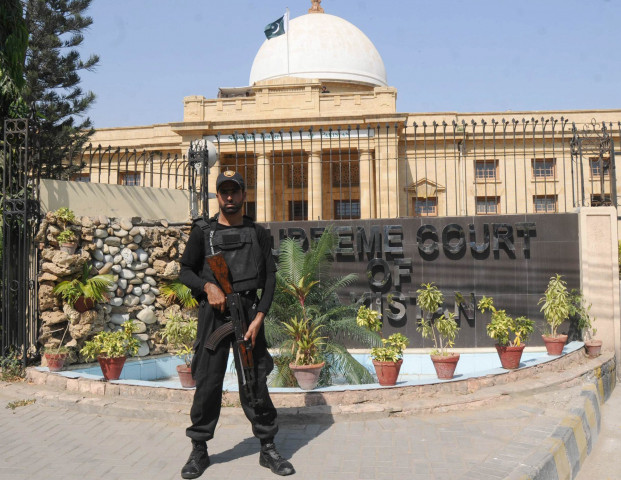Dissolve SSWMB, transfer responsibilities to local bodies, says SC
Apex court says board has failed to perform and is wasting public funds

Eight policemen with patchy records were terminated while 84 others were forcibly retired, the court was told. PHOTO: EXPRESS
Issuing a 64-page interim order, the apex court's three-judge bench noted that basic functions such as collection and disposal of solid waste, effective delivery of sanitation services and provision of free-environment, which were assigned to the SSWMB were carved out from the domain of the municipal bodies to improve collection and disposal of waste from different cities, particularly Karachi.
The judges felt 'very much disturbed' after going through the judicial commission's report and video footage made during the inquiry officer's visits to different cities in Sindh.
"The agony of the public at large in Sindh is increasing day by day, though the Sindh government is spending billions of rupees on the subject. In Karachi, the issue is worsening," the judges remarked.
The documents furnished by the officers showed that the local government department had allocated a budget of Rs200,000 per month to each union council, which included Rs70,000 to Rs80,000 for the salary component and Rs110,000 to Rs130,000 for other utilisations.
Garbage haul: Rs0.75m earmarked for Pindi waste management
It further showed that Rs400,000 per ward per month had been allocated to each town committee, while Rs500,000 per ward per month was allocated to each municipal committee.
The judges observed that instead of improving the functions of the local bodies the Sindh government introduced Sindh Solid Waste Management Board Act, 2014, assigning the board most of the functions that sanitary workers of the local bodies were to perform and for which they were being paid salaries.
They noted that every year Rs350 million was allocated to the board. "This board has not done anything till date to remedy the agonies of the residents of the cities except on paper, where it is shown to be active," the judges remarked.
The bench declared the SSWMB a replica of the Sindh government-owned North Sindh Urban Services Corporation (NSUSC), which was drawing handsome amounts from the Asian Development Bank and Sindh government but the amounts were being misused by the corporation's management.
Environmental protection: Govt-run hospitals to file reports on waste disposal by Feb 4
Referring to the SSWMB's agreements with a Chinese firm to lift garbage, the judges calculated that the SSWMB will have to pay almost $29 per ton for collection and disposal of solid waste at the transit point. Each truck could normally carry 12 to 15 tons of solid waste, which meant more than $435 per truck will be paid to the Chinese company hired for garbage collection by the local government in foreign exchange for the aforesaid job. This is more than Rs46,110.
The judges questioned, "Is it a feasible project where the Sindh government on one hand is paying salaries of sanitary workers within the local bodies and for the same job would be paying additional amount to the Chinese company to collect solid waste from the front end and transport it to the transit point".
"If this board is allowed to exist, it would be a permanent liability for the Sindh government," the judges remarked, adding that the provincial government was the trustee of the public funds and was accountable for the amounts it spends.
The apex court held the judicial commission's report as a charge-sheet with regard to the working of various departments of the provincial government, including the SSWMB, which had failed to deliver even though the management are drawing salaries in crores of rupees and a substantial amount was being paid for non-salary expenses.
Waste not want not: Conserve water, protect sources
"We, under these circumstances, are compelled to observe that this court has serious reservations with regards to the continuation of the SSWMB programmes," said the judges.
"Running a parallel organisation to perform the same function leads to bad governance and lack of responsibility and accountability, which is sadly the order of the day," they remarked.
"Experiments should end now. The non-functional board, which has never performed, should be dissolved by transferring its functions to the local bodies as provided under the Rules of Business. In doing this, the agonies of the residents will be minimised. It will also save the Sindh government from waste of public money of which the Sindh government is a trustee," said the judges.


















COMMENTS
Comments are moderated and generally will be posted if they are on-topic and not abusive.
For more information, please see our Comments FAQ